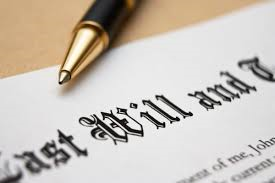
When Should You Make A Will?
When is the right time to make a will? The easiest answer to this question is NOW!!
Whilst the thought of making a will can be daunting it is essential to put one in place to ensure your assets including your house and money pass to the people you wish to receive it. A will also allows you to appoint ‘executors’ which ensures you are able to nominate the people who will deal with your affairs after you pass away. This provides you with complete peace of mind knowing your wishes will be enforced.
FAQs:
Am I too young to make a will?
Anyone over the age of 18 (16 if in the military) can make a legally binding will. If you are over this age then you should consider putting a will in place.
I want my assets to pass to my spouse and/or children. Why do I need a will?
A will is recommended for a number of reasons including their ability to appoint executors. Having a legally binding will demonstrates that you have nominated certain people to act on behalf of your estate after you pass away. This assists with the administration process and can make the process more straight forward for your loved ones.
Should you pass away without executing a valid will, the ‘Intestacy Rules’ govern who has the legal authority to sell your house or cash in your investments etc.
In addition, during a will appointment our team are able to discuss your personal circumstances and provide legal advice on all factors relevant to you. Wills can assist with other factors like tax planning and asset protection which you may not have previously considered.
Can I change my will if my circumstances change?
Yes. You can amend your will at any point whilst you have full mental capacity. This can be done by executing a new will (and revoking your previous will) or by implementing an attachment to your current will known as a codicil. We can advise you on the best method depending on your circumstances.
I don’t own a property. Do I need a will?
Yes. A common misconception is that a will is only required when you own a property. A will covers all assets held in your name including money in bank accounts, shareholdings, business interests, vehicles and all personal items. If you do not have a will your assets may not pass to the person/people which you wish to inherit them.
What happens if I die without leaving a will?
A person that passes away without a valid will is known to have died ‘intestate’ and the rules of intestacy come into force.
These rules are a flow chart of relatives which ends once one of the categories has been fulfilled and your assets will pass to all of the beneficiaries within that category. This is as follows:
1. Spouse/Civil Partner & Children
2. Parents
3. Brothers & Sisters of the whole blood (or their children)
4. Brothers & Sisters of the half blood (or their children)
5. Grandparents
6. Aunts & Uncles of the whole blood
7. Aunts & Uncles of the half blood
8. The crown (this is essentially the government receiving your estate)
The intestacy rules are a strict order of entitlement and do not provide any provision for unmarried couples, cohabitees, step children or spouses of your own children. In addition, every person that falls into that category is entitled to a share of your estate. This may include distant relatives that you have no relationship with. Executing a valid will ensures that the intestacy rules do not govern the distribution of your assets.
I am cohabiting with my partner but we are not married. Will they inherit my assets if I do not implement a valid will?
NO!! It is essential that you prepare a will if you are not married or in a civil partnership. As mentioned above, the intestacy rules do not provide for any unmarried couple regardless of how long you have been cohabiting. As such, your partner will receive none of your assets should you pass away. The only way to stop that happening is to prepare a valid will.
What is the will making process at Dickinson Parker Hill?
An initial appointment will be arranged with one of our team in which they will talk through your circumstances, provide any necessary legal advice and obtain your initial instructions. They can also answer any questions that you may have or locate areas that you may not have previously considered. This will ensure that you are fully informed prior to receiving a draft copy of your will.
Following this meeting, a draft copy of your will will be sent to you for review. This allows you time to read through the draft and locate any queries or amendments you may have. You can contact your fee earner to discuss this further.
Once you are happy with the draft will you will be invited back into the office to sign the document. At this time your will will be valid and your wishes enforced.
How long do the meetings take?
On average, the meetings take between 30 minutes to 1 hour however, this does depend on the complexity of your circumstances.
How do I book an appointment?
The easiest way to book an appointment is to call our offices on 01695 574 201 and a member of our reception team will be able to arrange a convenient appointment for you. Alternatively, you can email info@dphlaw.co.uk with your details and someone will get back to you.
What do I need to bring to my meeting?
We ask that you bring two forms of identification with you. This can be a passport, driving license or utility bill dated within the last 3 months. It may also be beneficial to bring with you full names and addresses of the people you would like to name in your will however, this is not a necessity.


